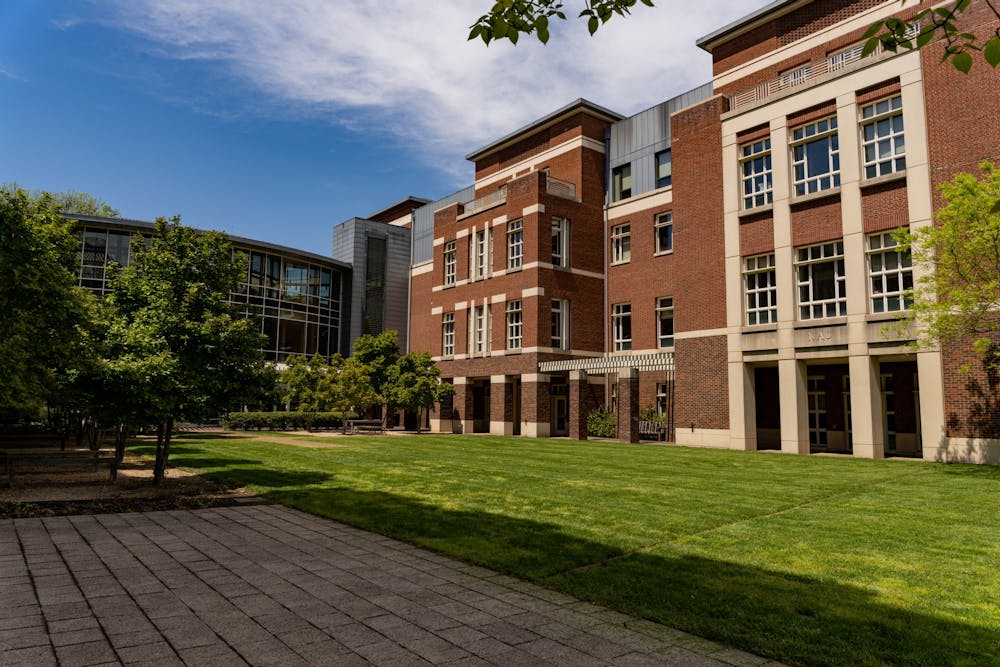A little over a decade ago, I meandered through Central Grounds to Nau Hall 101 for my first class at the University. Hailing from a small, rural community in the Shenandoah Valley, the big-town feel of U.Va. was initially intimidating, if not paralyzing. My stomach sank when I walked into the lecture hall for Introduction to Comparative Politics with Politics Prof. Leonard Schoppa. As I looked around, I saw a sea of students who I assumed had their act together. I had worked diligently in high school to earn a place at the University, but a part of me felt inadequate that day. I wanted to turn around and walk out the door.
I wish I could say that my first semester moved quickly from paralysis to confidence, but that was not the case. Much like any new stage in life, there was a learning curve. It was only years later that I realized transitioning from high school to college is a seismic shift that is almost unparalleled in life. I offer to current students the advice I would have given myself — embrace this adjustment period for what it is, and don’t miss the opportunities in front of you.
Over time, I became acclimated to the University and forged meaningful and lifelong friendships, not only with individuals, but also with community members. The academic rigor of the University pushed me to new intellectual depths and challenged me to be the scholar I never knew I could be. The liberal arts models at the University not only exposed me to a breadth of fields and methodologies but forced me to connect the dots between these seemingly disparate disciplines. During my second semester, for example, I remember noticing the overlapping themes between my philosophy of religion and social psychology classes. In an era of specialization, it is increasingly important to expand one’s purview and explore disciplines that on the surface may seem unrelated to our area of expertise. This makes our scholarship more holistic and convincing. As I have previously argued, studying the wide scope of topics that comprise the humanities reminds us of what it means to be human in the first place, and thus should have a place at our universities. The web of ideas that formed in my mind slowly started to make sense and exerted influence on the direction my life would go.
My curiosity for the humanities led me away from my architecture major and into the fields of religious studies and psychology. Even there, however, my path meandered still. Although I had originally planned to go to graduate school to be a clinical counselor, that plan was spoiled when I enrolled in classical Hebrew with Associate Religious Studies Prof. Gregory Goering my final year at the University. From that moment on, I could not escape the passion to study the Hebrew Bible in its original language and cultural milieu. How someone goes from aspiring architect to aspiring philologist and biblical scholar, I do not pretend to know, but I am thankful for the opportunities to study broadly at the University that made this journey possible. In your own journey, you may find similar detours along the way, yet this should not frighten you — you never know what opportunities might lie down that unfamiliar road. Failure to adjust may cause you to miss out on what you are truly passionate about.
After undergrad, I pursued an M.Div. at Princeton Seminary, and later an M.A. at the University of Chicago, studying the Hebrew Bible in its ancient Near Eastern context at both institutions. After briefly studying Northwest Semitic Philology at Johns Hopkins University, I accepted an offer to pursue a Ph.D. in Hebrew Bible at Duke University. A wry smile forms on my face every time I ponder my life’s journey thus far — my life could have gone a million other directions, but this is where the road led me. This is not where I set out to journey, but I would have it no other way. Once you graduate from U.Va., life will continue to wind down unexpected roads, and if you learn only one thing during your time at the University, I hope it is that adjusting to new circumstances is a critical life skill and comes with great consequence.
First-year students are currently beginning their academic journey at the University, and they come from a variety of backgrounds and experiences. My advice to them is to embrace this season of life. When you feel like turning around and walking out the door of the lecture hall, square your shoulders and take a seat among your peers. Be patient with yourself. Seldom do we warm up to new seasons of life overnight. Take a deep breath — this is just the beginning of the journey. No algorithm can predict where life’s winding paths will take you, and you do not need to have all the answers today. Dream big and be diligent, but hold to no vision of the future too tightly.
Matthew Arakaky is a Class of 2015 alumnus and a doctoral candidate in the Graduate Program of Religion at Duke University. He previously studied at the University of Virginia, Princeton Seminary, the University of Chicago and Johns Hopkins University.







